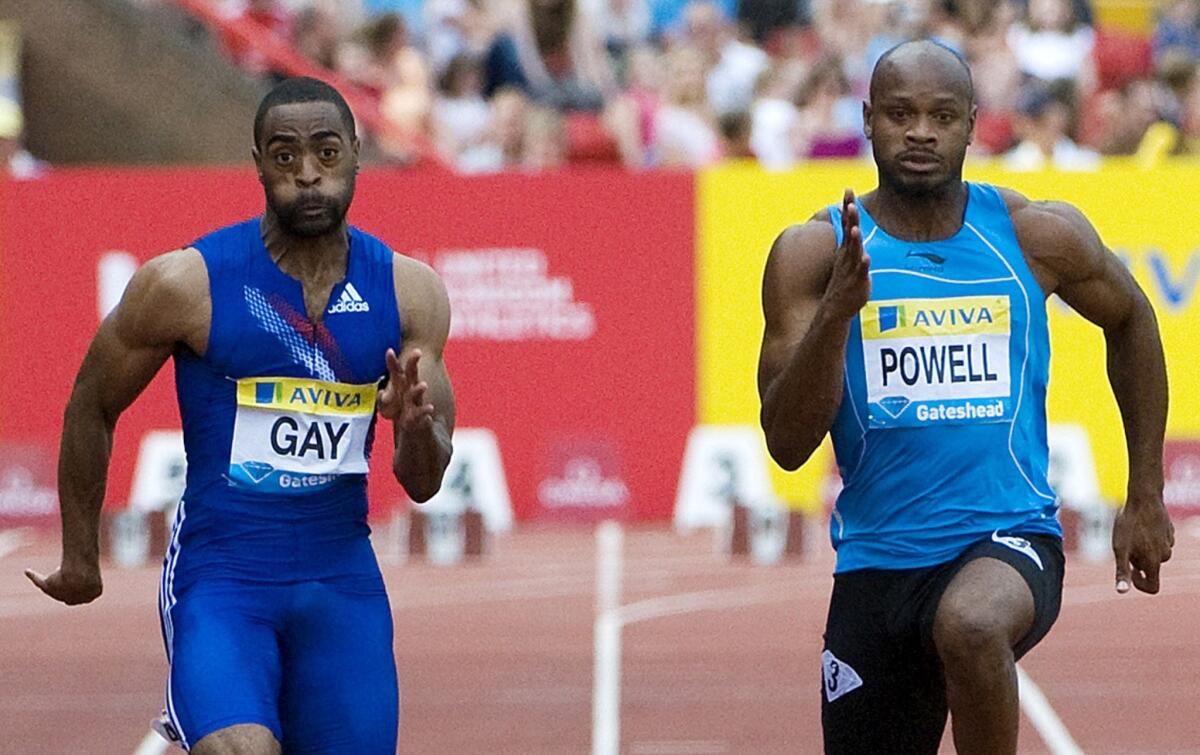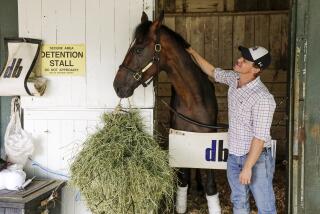Track’s credibility takes huge hit with big-name failed drug tests

Hey, pro cycling: Move over on that trash heap so there is some room for track and field.
Almost exactly a decade after the BALCO scandal all but destroyed track’s credibility, the sport is facing another legitimacy crisis.
Sunday, leading U.S. sprinter Tyson Gay and Jamaica’s Asafa Powell, Olympic gold medalist and former world-record holder in the 100 meters, confirmed they had tested positive for banned substances. There were news reports saying Powell was among five Olympic gold medalists from Jamaica who tested positive for stimulants at their national championships last month.
Add that to the doping mess in Turkish track and field, with charges brought against the 2012 women’s Olympic 1,500-meter champion and a two-time European hurdles champion, and the only thing worse for the sport would be if Usain Bolt tested positive. (Bolt’s agent, Ricky Simms, wrote in an email that none of the athletes he represents had tested positive.)
It would be easy to say the Gay story was shocking, but it also might be disingenuous. The use of performance-enhancing drugs in the sport has been so widespread over the last 50 years that having another great champion test positive is about as shocking as the gambling in the movie “Casablanca.”
All of the facts of the Gay situation — including the confirming test of his “B” sample — are not in. But the United States’ reigning 100- and 200-meter champion will withdraw from next month’s world championships, where his races against Bolt were expected to be among the highlights of the meet.
The surprising part of the Gay case is his willingness to take full responsibility for having the banned substance turn up in a May 16 out-of-competition drug test, even though he told reporters on a Sunday conference call there is an explanation that would suggest it was not his intention to dope.
Gay always has been a stand-up guy. “I don’t have a sabotage story. I don’t have any lies,” Gay was quoted as saying. “I don’t have any of those stories. I basically put my trust in someone, and I was let down.”
Gay, the 2007 world champion in the 100 and 200 and U.S.-record holder in the 100, would not identify the person in question. He indicated he would take any punishment “like a man.”
Defenders of track and field and cycling will be quick to say their sports catch people because their anti-doping efforts are serious, but that doesn’t absolve runners and cyclists of guilt for doping positives.
The anti-doping system has strict liability for anyone whose test comes back positive. Ignorance of what is in health supplements athletes use or what is in a substance recommended by a member of an athlete’s entourage is an explanation but not an exculpatory excuse.
The BALCO scandal — named for the California lab that helped design doping programs for athletes — began the undoing of several track athletes, including U.S. sprint stars Marion Jones and Kelli White, who had won the 100 and 200 at the 2003 world championships.
Three years later, U.S. sprinter Justin Gatlin tested positive for a steroid. Gatlin, then the reigning Olympic 100 champion and world 100 and 200 champion, vainly argued sabotage, served a four-year suspension and returned to win a bronze medal in the 100 at the 2012 Olympics.
Sunday, Powell’s agent, Paul Doyle, confirmed in an email that Powell and Sherone Simpson had tested positive. The London Daily Telegraph identified Nesta Carter as another Jamaican athlete who had tested positive. All had run on gold-medal Olympic relays.
In a statement, Powell said he tested positive for methylsynephrine but had never “knowingly or willingly taken any supplements or substances that break any rules. I am not now — nor have I ever been — a cheat.”
Last month, two-time Olympic 200-meter champion Veronica Campbell-Brown of Jamaica was suspended for a positive test that international track federation spokesman Nick Davies characterized as a “minor violation.”
At a certain point, minor and major just run together. The sport again is running off the rails, just as cycling did with Lance Armstrong at the throttle of a train wreck.
Tyson Gay is no Machiavellian liar like Armstrong. Gay’s doping violation may have been as inadvertent as it seems.
Yet that does not change how suspicious Gay’s stunning comeback this season suddenly feels, no matter how likable a person he is.
In track and field, as in cycling, it is sadly no longer possible to give the benefit of the doubt to anyone.
Only the doubt remains.
For track and field, that can only hasten the death of a sport that already is on life support in the United States.
More to Read
Get our high school sports newsletter
Prep Rally is devoted to the SoCal high school sports experience, bringing you scores, stories and a behind-the-scenes look at what makes prep sports so popular.
You may occasionally receive promotional content from the Los Angeles Times.






